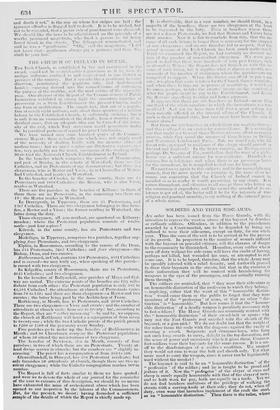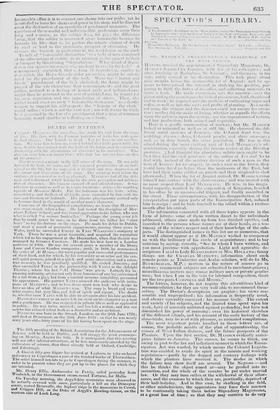SOLDIERS AND THEIR SIDE-ARMS.
AN order has been issued front the Horse Guards, with the intention to repress the wanton abuse of the bayonet by drunken or ruffianly soldiers. Offenders, in addition to the punishment awarded by a Court-martial, are to be degraded by being not suffered to wear their side-arms, except on duty, for one whole year. Thus the cure of the evil is to he arrived at by the process of its growth. In proportion to the number of wounds inflicted with the bayonet on peaceful citizens, will the chances of danger to the community be diminished. Hereafter, every soldier who is seen off duty without his side-arms will have the credit of having, perhaps not killed, but wounded his man, or attempted to stab some one. It is to be hoped, therefore, that the whole Army may be speedily infected with a rabid ferocity, awl forthwith proceed to draw their bayonets in the streets, but that in the exercise of their indiscretion they will be content with brandishing the weapons in the eyes of the passengers, and not actually running them through.
- The soldiers are reminded, that " they- wear their side-arms as an honourable distinction of the profession to which they belong," —implying, either that the want of this " honourable distinc- tion woulc1 cause them or the public to forget that they were members of the " profession" of arms, or that no other " dis- tinction" is " honourable." But how comes it that the " honour- able distinction" of a deadly weapon is peculiarly necessary only to foonsoldiers? The Horse Guards are commonly content with the " honourable distinction" of their sword-belt or spurs: why may not the Foot Guards rest satisfied with the sheath of the bayonet, or a gun-pick? We do not doubt but that the weight tf the sabre turns the scale with the dra000ns against the vanity of wearing a sword. Sergeants and ''ilrummer-boys, who have not such long swords to carry, delieht in the toy-decoration, and the sense of power and superiority whieh it gives them. Common foot-soldiers wear their bayonets for the same reason. It is a set- off to the disadvantages "of a soldier s condition. We suspect they would not care to wear the belt and sheath only. Yet what more need to carry the weapon, since it never can be legitimately used without the musket ? The bayonet is said to be an " honourable distinction" of the " profession" of the soldier ; and be is taught to be proud and jealous of it. Now the " profession" of the slayer of oxen and sheep is surely equally honourable with that of the slayer of men; and as both work for pay, both are equally in a trade. Yet we do not find butchers ambitious of the privilege of walking the streets with a carving-knife at their side; they do not, when off duty, even wear that harmless implement of the craft the steel, as an " honourable distinction." Then there is the tailor, whose hot:crumble (Alice it is to convert our shame into our pride; yet he is satisfied to leave his shears tied goose in his shop, and he does not covet the distinction of an epaulette uf parchment measures. The aretobers of these useful net indiapensable professions serve their king and coat tiny, as the soldier does, for pay ; the diffeience Leine:, that the sohlier is accounted more honourable because he hazards his life—that is, lie prefers the remote chance of death hv steel or lead to the proximate pleispect of starvation. He cheoses the barrack in preference to the wed:house or the gaol. To talk Of " honourable distinetion to a Indy or mem coinp,,,q uf the offscourings of society, is as en:using as the appeal to their et-respect by threatening " degtadat ion." What (head of theft:t- ad ion can operate up en mon vvlio are kept in an e bv the 1a..11? A co ntemporary suggested, that a hfrin or ti at Ivhiell the 1 ler,e Guards oiler prescribes, !Meta be tibtt- till ii for the purishownt of the lash. Were the " brutal and blotiv punislitnent of the lash abolished, the Artily tnielit he pureed of the vile charzwters that contaminate it : and the good bu!dier, restored to a feeling of lamest pride feel independence, allele then be governed as the it or mankind are, hv regard for his own reputation and the approbation of other.. Then, the soldier %rout(' covet ifo such " howairable olist hareem - as a (leanly weapon to support his self-respect : the " honeur of the cloth ivould suffice: which is not the ease now : nor will it ever be while Iii'i, fee tined by the fear of a pee ishinent that a mail of common humaaity would shudder at iellicting on a brute.



























 Previous page
Previous page